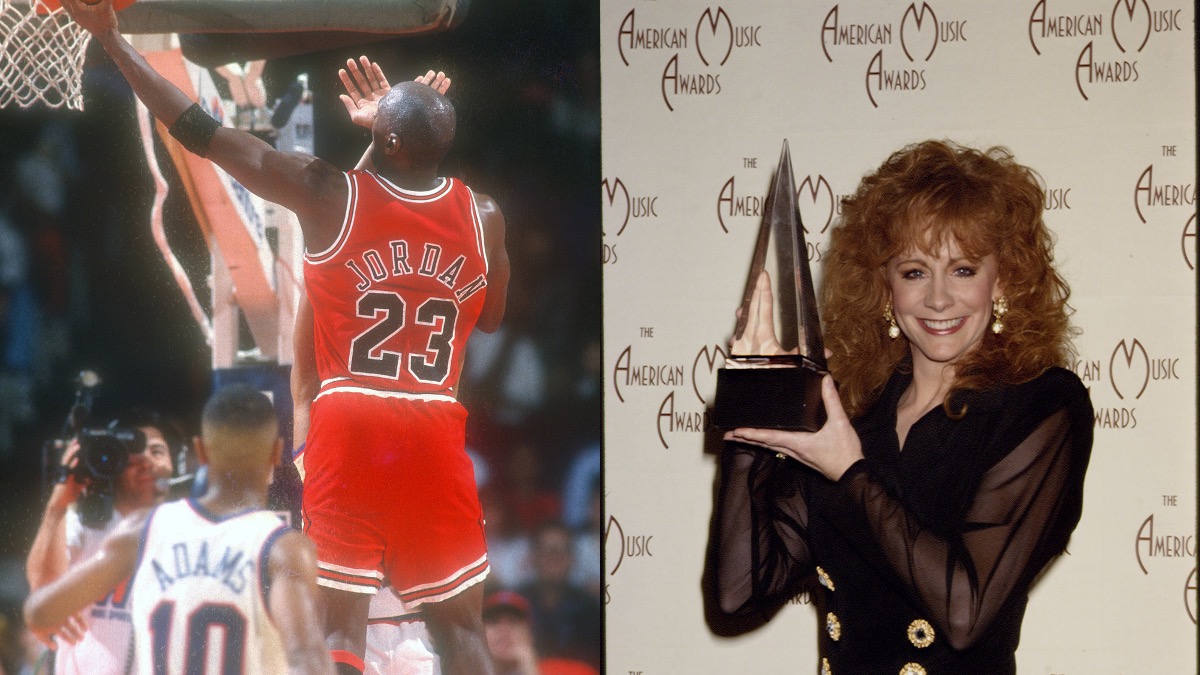Why Did Reba McEntire ‘Feel Sorry’ for Michael Jordan in the ’90s?
Country superstar and actor Reba McEntire said that she “[felt] sorry for people such as Michael Jordan” in the ‘90s. But what tragedy inspired her to express her sympathy for the NBA legend?

Reba McEntire and Michael Jordan, ’90s superstars
By the ‘90s, McEntire and Jordan were both luminaries of their particular industries. She was one of country music’s leading artists and he was a certified sports icon as the world-famous centerpiece of the Chicago Bulls.
NBA.com writes a “brief listing of [Jordan’s] top accomplishments would include the following: Rookie of the Year; Five-time NBA MVP; Six-time NBA champion; Six-time NBA Finals MVP …” But even a “brief listing” of only his highest career achievements isn’t really that brief.
So, why did McEntire “feel sorry” enough for him to write about it in her 1994 autobiography?
Michael Jordan grieved the murder of his father
In Reba: My Story, McEntire wrote that she and Jordan had something more in common than their superstardom. They both shared their grief with the public after life-shattering tragedy. And that unique similarity inspired sympathy for the NBA champion from the singer.
“I feel sorry for people such as Michael Jordan, whose father was murdered during the time I was writing this,” she shared in her book.
According to CBS affiliate WBTW News13, James Jordan had stopped alongside a road to nap while traveling from Charlotte to Wilmington, N.C. in 1993. There, two teenage accomplices shot him, stole his phone and some NBA rings, then discarded his body in a swamp.
“Michael was hurting but wasn’t left to suffer in privacy,” McEntire lamented. She said he was “hounded by strangers with notepads and cameras who wanted to plaster his grief across the fronts of newspapers and magazines to make money.”
And that was something she could relate to herself.
Tragedy killed most of Reba McEntire’s band
While mourning the loss of most of her band after a 1991 plane crash, McEntire was asked upsetting questions by the press. Many people were curious about what she knew and how she felt. And some people had an impression that she owed it to the public to share her grief.
She wrote in her autobiography that she gave an in-depth interview to People magazine. She hoped that would “satisfy the public’s need to know” what happened. But she was still asked, with open defiance to her own wishes, to recount the painful details for reporters.
“Only someone who has been through that can realize how hard it can be on them,” she wrote regarding the experience. “After you’ve given all you can to support friends, loved ones, and yourself, you have nothing left for the millions of strangers who read or watch the mass media. You just have nothing left.”
So, McEntire felt she could relate to what Jordan went through in the wake of his father’s murder because she’d also been asked to give so much. And that’s seemingly why she put her sympathy for him in writing — in a New York Times bestseller.


